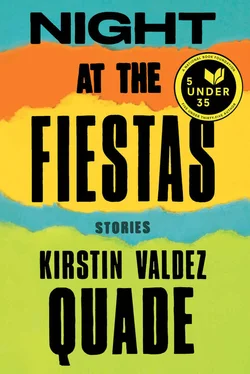“But what happened?” My question was less forceful now.
“My poor, poor sister.” My mother’s eyes welled and she shook her head again. “It’s best forgotten. It hurts me to think about it.”
I believed that what Nemecia told me was true. What confused me was that no one ever treated Nemecia like a murderer. If anything, they were especially nice to her. I wondered if they knew what she’d done. I wondered if they were afraid of what she might do to them. My mother afraid of a child — the idea was outrageous, but it explained, perhaps, the little extra attentions she gave my cousin that so stung me: the brush of her fingertips on Nemecia’s cheek, the way, when kissing us goodnight, her lips lingered against Nemecia’s hair.
Perhaps the whole town was terrified, watching my cousin, and I watched Nemecia, too, as she talked with her teacher on the school steps, as she helped my mother before dinner. But my cousin never slipped, and though sometimes I thought I caught glimmers of caution in the faces of the adults, I couldn’t be sure.
The whole town seemed to have agreed to keep me in the dark, but I thought if anyone would be vocal about her disapproval — and surely she disapproved of murder — it would be my great-aunt Paulita. I asked her about it one afternoon at her house as we made tortillas, careful not to betray Nemecia’s secret. “What happened to my grand-father?” I pinched off a ball of dough and handed it to her.
“It was beyond imagining,” Paulita said. She rolled the dough in fierce, sharp thrusts. I thought she’d go on, but she only said again, “Beyond imagining.”
Except that I could imagine Nemecia killing someone. Hell, demons, flames — these were the horrors I couldn’t picture. Nemecia’s fury, though — that was completely plausible.
“But what happened? ”
Paulita flipped the disk of dough, rolled it again, slapped it on the hot iron top of the stove, where it blistered. She pointed at me with the rolling pin. “You’re lucky, Maria, to have been born after that day. You’re untouched. The rest of us will never forget it, but you, mi hijita, and the twins, are untouched.” She opened the front door of her stove with an iron hook and jabbed at the fire inside.
No one would talk about what had happened when Nemecia was five. And soon I stopped asking. Each night I thought Nemecia might say something more about her crime, but she never mentioned it again.
And each night, I stayed awake as long as I could, waiting for Nemecia to come after me in the dark.
ANY NEW THING I GOT, Nemecia ruined, not enough that it was unusable, or even very noticeable, but just a little: a scrape with her fingernail in the wood of a pencil, a tear on the inside hem of a dress, a crease in the page of a book. I complained once, when Nemecia knocked my new windup jumping frog against the stone step. I thrust the frog at my mother, demanding she look at the scratch in the tin. My mother folded the toy back into my palm and shook her head, disappointed. “Think of other children,” she said. She meant children I knew, children from Cuipas. “So many children don’t have such beautiful new things.”
I was often put in my cousin’s care. My mother was glad of Nemecia’s help; she was busy with the store and with my three-year-old brothers. I don’t think she ever imagined that my cousin wished me harm. My mother was hawkish about her children’s safety — later, when I was fifteen, she refused to serve a neighbor’s aging farmhand in the store for a year because he’d whistled at me — but she trusted Nemecia. Nemecia, almost an orphan, the daughter of my mother’s beloved older sister. Nemecia was my mother’s first and — I knew it even then — favorite child.
My cousin was fierce with her love and with her hate, and sometimes I couldn’t tell the difference. I seemed to provoke her without meaning to. At her angriest, she would lash out with slaps and pinches that turned my skin red and blue. Her anger would sometimes last weeks, aggression that would fade into long silences. I knew I was forgiven when she would begin to tell me stories, ghost stories about La Llorona, who haunted arroyos and wailed like the wind at approaching death, stories about bandits and the terrible things they would do to young girls, and, worse, stories about our family. Then she would hold and kiss me and tell me that though it was all true, every word, and though I was bad and didn’t deserve it, she loved me still.
Not all her stories scared me. Some were wonderful — elaborate sagas that unfurled over weeks, adventures of girls like us who ran away. And every one of her stories belonged to us alone. She braided my hair at night, snapped back if a boy teased me, showed me how to walk so that I looked taller. “I’m here to take care of you,” she told me. “That’s why I’m here.”
WHEN SHE TURNED FOURTEEN, Nemecia’s skin turned red and oily and swollen with pustules. It looked tender. She began to laugh at me for my thick eyebrows and crooked teeth, things I hadn’t noticed until then.
One night she came into our bedroom and looked at herself in the mirror for a long time. When she moved away, she crossed to where I sat on the bed and dug her nail into my right cheek. I yelped, jerked my head. “Shh,” she said kindly. With one hand she smoothed my hair, and I felt myself soften under her touch as she worked her nail through my skin. It hurt only a little, and what did I, at seven years old, care about beauty? As I sat snug between Nemecia’s knees, my face in her hands, her attention swept over me the way I imagined a wave would, warm and slow and salty.
Night after night I sat between her knees while she opened and reopened the wound. One day she’d make a game of it, tell me that I looked like a pirate; another day she’d say it was her duty to mark me, because I had sinned. Daily she and my mother worked against each other, my mother spreading salve on the scab each morning, Nemecia easing it open each night with her nails. “Why don’t you heal, Maria?” my mother wondered as she fed me cloves of raw garlic. Why didn’t I tell her? I don’t know exactly, but I suppose I needed to be drawn into Nemecia’s story.
By the time Nemecia finally lost interest and let my cheek heal, the scar reached from the side of my nose to my lip. It made me look dissatisfied, and it turned purple in the winter.
AFTER HER SIXTEENTH BIRTHDAY, Nemecia left me alone. It was normal, my mother said, for her to spend more time by herself or with friends. At dinner my cousin was still funny with my parents, chatty with the aunts and uncles. But those strange secret fits of rage and adoration — all the attention she’d once focused on me — ended completely. She had turned away from me, but instead of relief, I felt emptiness.
I tried to force Nemecia back into our old closeness. I bought her caramels, nudged her in church as though we shared some secret joke. Once at school I ran up to where she stood with some older girls. “Nemecia!” I exclaimed, as though I’d been looking everywhere for her, and grabbed her hand. She didn’t push me away or snap at me, just smiled distantly and turned back to her friends.
We still shared our room, but she went to bed late. She no longer told stories, no longer brushed my hair, no longer walked with me to school. Nemecia stopped seeing me, and without her gaze I became indistinct to myself. I’d lie in bed waiting for her, holding myself still until I could no longer feel the sheets on my skin, until I was bodiless in the dark. Eventually, Nemecia would come in, and when she did, I’d be unable to speak.
My skin lost its color, my body its mass, until one morning in May when, as I gazed out the classroom window, I saw old Mrs. Romero walking down the street, her shawl billowing around her like wings. My teacher called my name sharply, and I was surprised to find myself in my body, sitting solid in my desk. I decided right then: I would lead the Corpus Christi procession. I would wear the wings and everyone would see me.
Читать дальше












